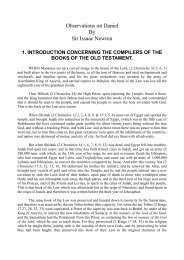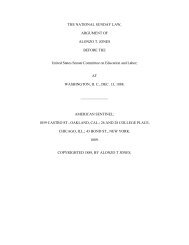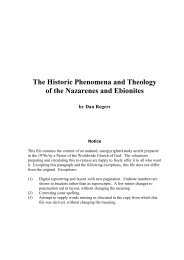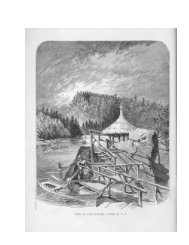THE EARLY CHRISTIAN SABBATH - Friends of the Sabbath Australia
THE EARLY CHRISTIAN SABBATH - Friends of the Sabbath Australia
THE EARLY CHRISTIAN SABBATH - Friends of the Sabbath Australia
Create successful ePaper yourself
Turn your PDF publications into a flip-book with our unique Google optimized e-Paper software.
The Early Christian <strong>Sabbath</strong><br />
He disposed <strong>of</strong> <strong>the</strong> priesthood, <strong>of</strong> sacrifices, <strong>of</strong> washings, <strong>of</strong> ceremonial annual days, but<br />
never did he give basis for sweeping away <strong>the</strong> weekly <strong>Sabbath</strong> <strong>of</strong> <strong>the</strong> moral law.<br />
It was anti-Judaism which caused some leaders in <strong>the</strong> early church, particularly in<br />
<strong>the</strong> West, where <strong>the</strong> influence <strong>of</strong> Rome, <strong>the</strong> capital <strong>of</strong> <strong>the</strong> empire, was strong, to confuse<br />
<strong>the</strong> issue <strong>of</strong> what was done away at <strong>the</strong> cross, and to brand observance <strong>of</strong> <strong>the</strong> seventh-day<br />
<strong>Sabbath</strong> as Jewish.<br />
During <strong>the</strong> early centuries <strong>of</strong> <strong>the</strong> Christian Era <strong>the</strong> Jews had fallen into serious<br />
difficulties with <strong>the</strong> Roman authorities. There were local outbreaks by <strong>the</strong> Jews against<br />
<strong>the</strong> Romans even in <strong>the</strong> days <strong>of</strong> Christ and <strong>the</strong> apostles. The Jews considered <strong>the</strong>mselves<br />
<strong>the</strong> chosen people <strong>of</strong> God, and bitterly resented <strong>the</strong>ir being under <strong>the</strong> domination <strong>of</strong> a<br />
pagan people, <strong>the</strong> Romans, who thought <strong>the</strong>mselves in turn <strong>the</strong> favorite <strong>of</strong> <strong>the</strong>ir gods, and<br />
held <strong>the</strong> Jews in contempt.<br />
At last, about AD 66, <strong>the</strong>re broke out a serious rebellion <strong>of</strong> <strong>the</strong> Jews against <strong>the</strong><br />
Romans. Roman armies were sent into Palestine. Eventually <strong>the</strong> Jewish capital,<br />
Jerusalem, was captured and <strong>the</strong> magnificent temple which Herod had built was<br />
destroyed. Thousands <strong>of</strong> Jews perished in this fearful war, which did not terminate until<br />
AD 70.<br />
Even after this awful punishment <strong>the</strong> Jews were still restive under <strong>the</strong> Roman<br />
yoke. There were serious Jewish revolts about <strong>the</strong> year AD 115. About AD 132, <strong>the</strong> Jews<br />
engaged in ano<strong>the</strong>r great rebellion. Again <strong>the</strong> Jewish forces were cut to pieces. The city<br />
<strong>of</strong> Jerusalem was taken and completely destroyed, and plows were dragged over its site.<br />
When <strong>the</strong> city was again rebuilt, it was restored as a Gentile city, renamed as such, and<br />
laws were passed forbidding any Jew to enter it.<br />
Naturally this caused anything Jewish to be discredited among <strong>the</strong> people <strong>of</strong> <strong>the</strong><br />
Roman Empire, especially in <strong>the</strong> West and in <strong>the</strong> city <strong>of</strong> Rome. The Jews were looked<br />
upon not only with contempt, but also with fear; and it was not well for one to be<br />
associated with <strong>the</strong>m. Anti-Jewish feeling was widespread and deep. It seriously affected<br />
<strong>the</strong> attitude <strong>of</strong> Christians toward those elements <strong>of</strong> worship which <strong>the</strong>y had properly<br />
inherited through <strong>the</strong> inspired Hebrew Scriptures. In turn, <strong>the</strong> misfortunes <strong>of</strong> <strong>the</strong> Jews<br />
caused <strong>the</strong>m to feel bitter toward <strong>the</strong> Christians, whom <strong>the</strong>y considered a semi pagan<br />
counterfeit <strong>of</strong> historic Judaism.<br />
The Jews resented, too, <strong>the</strong> astonishingly rapid growth <strong>of</strong> <strong>the</strong> Christian church,<br />
and were unceasing in <strong>the</strong>ir efforts to discredit <strong>the</strong> Christians. To do this, <strong>the</strong>y spread<br />
damaging reports concerning <strong>the</strong>m. The Jewish people were forbidden to have any<br />
communication with <strong>the</strong> Christians, who were called blasphemers and crazy fanatics.<br />
Justin, writing about AD 150, has Trypho, a Jew, speak, for his race:<br />
“Our teachers laid down a law that we should have no intercourse with any <strong>of</strong> you<br />
[Christians], and that we should not have even any communication with you on <strong>the</strong>se<br />
questions. For you utter many blasphemies.” - Dialogue With Trypho, chapter 38, in The<br />
Ante-Nicene Fa<strong>the</strong>rs, volume 1, Page 213.<br />
Justin writes, too, that <strong>the</strong> Jews cursed Christ in <strong>the</strong> synagogue:<br />
“I hold that those <strong>of</strong> <strong>the</strong> seed <strong>of</strong> Abraham who live according to <strong>the</strong> law, and do<br />
not believe in this Christ before death, shall likewise not be saved, and especially those<br />
who have ana<strong>the</strong>matized and do ana<strong>the</strong>matize this very Christ in <strong>the</strong> synagogues, and<br />
everything by which <strong>the</strong>y might obtain salvation and escape <strong>the</strong> vengeance <strong>of</strong> fire.” -<br />
Ibid., chapter 47, Page 218.<br />
20

















